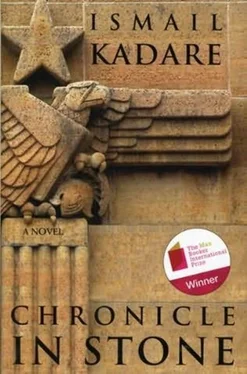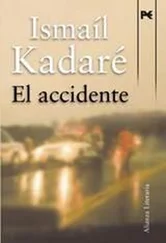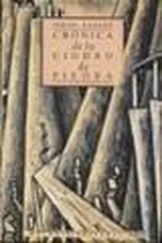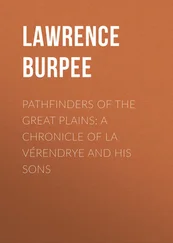Ismaíl Kadaré - Chronicle in Stone
Здесь есть возможность читать онлайн «Ismaíl Kadaré - Chronicle in Stone» весь текст электронной книги совершенно бесплатно (целиком полную версию без сокращений). В некоторых случаях можно слушать аудио, скачать через торрент в формате fb2 и присутствует краткое содержание. Жанр: Современная проза, на английском языке. Описание произведения, (предисловие) а так же отзывы посетителей доступны на портале библиотеки ЛибКат.
- Название:Chronicle in Stone
- Автор:
- Жанр:
- Год:неизвестен
- ISBN:нет данных
- Рейтинг книги:4 / 5. Голосов: 1
-
Избранное:Добавить в избранное
- Отзывы:
-
Ваша оценка:
- 80
- 1
- 2
- 3
- 4
- 5
Chronicle in Stone: краткое содержание, описание и аннотация
Предлагаем к чтению аннотацию, описание, краткое содержание или предисловие (зависит от того, что написал сам автор книги «Chronicle in Stone»). Если вы не нашли необходимую информацию о книге — напишите в комментариях, мы постараемся отыскать её.
Chronicle in Stone — читать онлайн бесплатно полную книгу (весь текст) целиком
Ниже представлен текст книги, разбитый по страницам. Система сохранения места последней прочитанной страницы, позволяет с удобством читать онлайн бесплатно книгу «Chronicle in Stone», без необходимости каждый раз заново искать на чём Вы остановились. Поставьте закладку, и сможете в любой момент перейти на страницу, на которой закончили чтение.
Интервал:
Закладка:
Apparently some people took pity on it just as I did, and tried to invent excuses for it. It was rumoured that it was all the fault of the former mayor, the one who’d been in office at the time of the gun’s inauguration. People said he’d sold a key part of the mechanism – the range finder – and spent the proceeds on a wild orgy with a Macedonian whore in the fleshpots of Skopje. So he’d left the unfortunate weapon to cope with hostile skies without a range finder, which was like robbing it of its eyes.
Outrage steadily infiltrated the city. Meanwhile, other folk, of the kind who were utterly intransigent when the city’s honour was at stake (as they had been in the case of Argjir Argjiri) had a change of heart. True, there was something wrong with the gun, they said, but the defect had nothing to do with those stories about thieving and Macedonian whores. It was suffering a routine mechanical malfunction of the sort that could afflict materiel in any army in the world. Anyway, hadn’t officers of both opposing forces been to examine it, and taken a sceptical attitude towards its potential performance (not to mention the more offensive remarks they had made)? They can keep their opinions to themselves! others retorted. Don’t soldiers always bad-mouth their opponents’ equipment to make their own seem superior? Sure, armies have problems, but so do cities. Let others tear themselves to pieces with whatever weapons they want. But the city had to defend itself, by its own means. If all it had to fight with were lances – even if all it had were medieval pikestaffs! – then so be it! Because when all’s said and done, this was a matter of honour…
By the end of a day during which the arguments had gone back and forth, the view that the gun should be repaired finally prevailed. A procession consisting of a municipal mechanic, two of the town’s best clockmakers, Xivo Gavo the chronicler, the former artillery man Avdo Babaramo, a priest who had been unfrocked barely two weeks before and who claimed to have been a number in a gun crew in the First World War and to have even shot down a Turkish plane, and Qani Kekezi, whose presence had led Dino Çiço to change his mind and stay at home at the last minute, wound its way up to the citadel and its tower.
The whole city waited, holding its breath. Women were asking from the windows:
“Is it fixed?”
“Not yet.”
“Lord help us.”
Everyone was asking that question, morning, noon and especially towards evening. The defect was apparently serious. That was when the anti-aircraft battery that later shot down the first English plane arrived. Two days later, the old antiaircraft gun was fired for the first time. The joy felt by everyone, especially the children, was indescribable. Unlike the salvos of the battery, the boom of the old anti-aircraft gun was lonely and powerful. There was really something regal about it. But that day it didn’t manage to hit anything. Nor did it make a hit on any subsequent day.
As we sat in the shelter Ilir would say to me, “It’s formidable. Today it will get one for sure.” But it never did. Every day we would come up out of the shelter gripped by sadness. We would stand close to the grown-ups to hear what they were saying. And what we heard was disheartening. They had no faith in it. After every bombing they would repeat resentfully:
“It’s too old to shoot down today’s planes.”
Over the preceding weeks, when the city had repeatedly changed hands, our anti-aircraft gun had missed every shot. During the Italian occupation it had fired at English planes. When the Greeks came its targets were the Italian planes that bombed us four times in succession. Neither of the retreating armies had touched the gun. The evacuations were quick and chaotic, and it was too much trouble for either army to dismantle the gun at the top of the fortress. Or perhaps, in their disarray, they forgot it or pretended to forget it, confident that when they had retaken the city they would find the veteran weapon just as they had left it.
On one of those days when the city had no government an unknown plane was spotted in the sky, coming from a direction from which none had ever come before. Perhaps it was the same bewildered pilot who had flown over last week and dropped leaflets in German that began: “Citizens of Hamburg!”
In recent days the appearance of stray aircraft in the skies over our city had become commonplace. They must have wandered off course after some battle, or were pretending to be off course while flying towards the enemy. Turning from their set itinerary at the earliest opportunity, especially when the weather was bad, they would leave their companions and loop idly in the sky until their flying time was up. They acted pretty much the way we did some mornings when, instead of going to school, we played truant until it was time to go home for lunch.
The unknown aircraft flew slowly, looking weary and bored. It must have been coming out of some battle, even though the direction it came from seemed suspect. Later on, trying to figure out why the bemused pilot had suddenly dropped a bomb on us, people guessed that he must have noticed that he had one left (usually these stray pilots dropped their bombs deep in the woods or up in the mountains) and must have said to himself, as he flew over, “Well, why not just drop it on this city whose name I don’t even know?” And he dropped it.
But this time the city couldn’t stand the blow. During the long days of apathy, the long barrel of the old anti-aircraft gun had let its imagination run wild. Its repressed desire to get mixed up in the affairs of the sky was slumbering within it, ready to awaken. And when unknown planes flew over the city, the temptation to open fire at the intruders was particularly strong.
It was one of those rare days when we had gone out to play. We had gone pretty far, to the foot of the citadel, near the isolated house of Avdo Babaramo, the old gunner. Often, in the shelter or the coffeehouse, old Avdo would tell war stories, and though we had never seen anything but pumpkins and cucumbers in his hands, and certainly never cannon shells, he nevertheless enjoyed the respect of all.
We were playing right in front of Avdo’s house when we heard the noise of an engine. Some passers-by stopped and, shading their eyes, searched the sky for the plane.
“There it is!” someone said.
“Looks like an Italian plane.”
Uncle Avdo and his wife came to the window. Other passers-by had stopped in the street to look.
The plane flew slowly. The lone, loud hum of its engines came in waves. Silence fell over the onlookers. Then suddenly someone turned towards Avdo Babaramo’s window and called, “Uncle Avdo, why don’t you take a shot with our anti-aircraft gun for once? Shoot that pig looping about up there.”
The crowd murmured. As for us kids, our hearts pounded with excitement.
“Yeah, shoot it down, Uncle Avdo!” two or three voices shouted.
“Why provoke the devil?” Uncle Avdo answered from the window. “Leave him alone.”
“Come on, Uncle Avdo!” we all cried, “shoot it down!”
“Shut up, you little devils!” someone said. “Quiet!”
“Why should they be quiet? They’re right.”
“Shoot it down, Avdo. There’s the anti-aircraft gun, sitting right up there. Doing nothing.”
“Why look for trouble?” asked Harilla Lluka from the middle of the crowd. “Better leave him alone. We’ll only make him angry and he’ll bomb us to bits.”
“We’ve had enough of that already, son.”
At first Avdo Babaramo’s face grew dark, but then he brightened up. A thin blue vein stood out on his forehead. He lit a cigarette.
“Shoot it down, Uncle Avdo!” Ilir shouted, almost sobbing.
Suddenly a black object fell away from the belly of the plane, and a few seconds later we heard an explosion.
Читать дальшеИнтервал:
Закладка:
Похожие книги на «Chronicle in Stone»
Представляем Вашему вниманию похожие книги на «Chronicle in Stone» списком для выбора. Мы отобрали схожую по названию и смыслу литературу в надежде предоставить читателям больше вариантов отыскать новые, интересные, ещё непрочитанные произведения.
Обсуждение, отзывы о книге «Chronicle in Stone» и просто собственные мнения читателей. Оставьте ваши комментарии, напишите, что Вы думаете о произведении, его смысле или главных героях. Укажите что конкретно понравилось, а что нет, и почему Вы так считаете.












